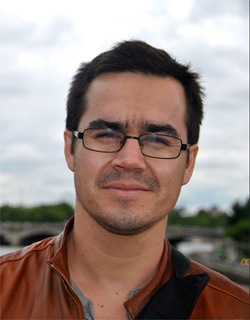 Cristobal Petrovich was awarded the Bishop fellowship for his work in orbital dynamics, particularly for elucidating the role of collisional dynamics in the evolution of stellar systems and how it can be linked to exciting recent observations.
Cristobal Petrovich was awarded the Bishop fellowship for his work in orbital dynamics, particularly for elucidating the role of collisional dynamics in the evolution of stellar systems and how it can be linked to exciting recent observations.
Most stars are part of multiple stellar systems and their orbital evolution can lead to close approaches between the stars (collisional dynamics), which can be responsible for many astrophysical phenomena including mergers, gravitational-wave mergers, transient events, short-period binaries, and so on. My work describes the dynamics of some these systems in order to understand some of the recent observations and astrophysical puzzles.
One recent application was the orbital evolution of black hole binaries in the galactic center where we studied the exciting possibility that these their evolution leads to mergers by gravitational-wave radiation. The galactic center is a special place in our galaxy as the binaries are strongly affected by both the gravity of the central supermassive black hole and the dense nuclear star cluster. We found that their combined acts in synergy and leads to mergers at a very high rate, which can contribute to a significant fraction of the recent detections by LIGO and Virgo. Our results are applicable to binaries in general, not only black hole binaries, and we plan to study the consequences our results for other astrophysical phenomena.
Another interesting application that I recently studied is the evolution of binaries when at least one star is white dwarf (WD). In this case, we showed that collisional dynamics can play a role on delivering material from an old planetary system very close to the WD so it gets tidally disrupted and then accreted onto WD’s surface. This process can explain why a large fraction of the WDs show metals in their atmospheres when we expect to only observe hydrogen and helium (metals sink very quickly below the atmosphere). This is interesting because it can teach us about planet formation and evolution in stars more massive than the sun (typically A and F stars) as well as the fate of the Solar system well beyond the Sun’s main sequence lifetime.
His relevant publications on these topics include:
“Greatly enhanced merger rates of compact-object binaries in non-spherical nuclear star clusters” (Petrovich, C. & Antonini, F. 2017, ApJ, 846, 146; https://arxiv.org/abs/1705.05848)
“Planetary engulfment as a trigger for white dwarf pollution” (Petrovich, C. & Muñoz, D., 2017, ApJ, 834, 116; https://arxiv.org/abs/1607.04891)
“On the stability and collisions in triple stellar systems” (He, M., & Petrovich, C. 2017, MNRAS, in press; https://arxiv.org/abs/1710.04698)
The Jeffrey L. Bishop Fellowship is granted every two years for excellence in research in astrophysical dynamics.
Jeffrey Bishop was one of CITA’s first postdoctoral fellows. He was killed in an automobile accident shortly after leaving the Institute and this award was one of several created by his mother, Mrs. Muriel Simmons, to remember his life and work. Her donation is matched by CITA.
 Cristobal Petrovich was awarded the Bishop fellowship for his work in orbital dynamics, particularly for elucidating the role of collisional dynamics in the evolution of stellar systems and how it can be linked to exciting recent observations.
Cristobal Petrovich was awarded the Bishop fellowship for his work in orbital dynamics, particularly for elucidating the role of collisional dynamics in the evolution of stellar systems and how it can be linked to exciting recent observations.